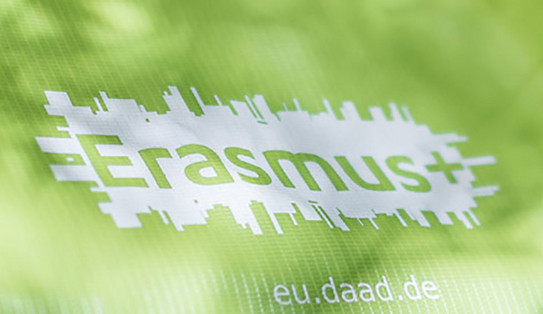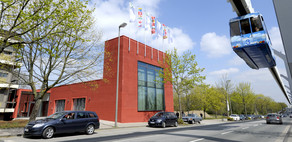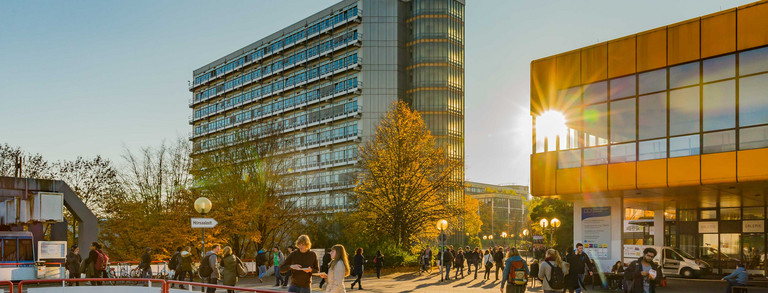Explore the World in an Environmentally Friendly Way
A stay abroad is an excellent way to take in new perspectives both professionally and personally and to get a better understanding of other people and cultures. Traveling unfortunately always leaves an ecological footprint, but students can still try to make their travel and everyday life as carbon-neutral as possible, even during a stay abroad.


Tips for Sustainable Travel

There are many ways to make stays abroad during your studies sustainable, resource-efficient, and climate-friendly as well. Use these tips when planning your stay abroad!
You can find good examples for suustainable travel in the testimonials from the fabcing scholars: The Department of Biochemical and Chemical Engineering's alumni association (fabcing) awards scholarships to students who choose sustainable methods to travel to their destinations, even outside of Europe. And this blog page shows how you can make even a long sustainable trip (e.g. to Greece) entertaining and also experience all the Europe has to offer on the way.
-
Consider nearby destinations when choosing a host university. It is also possible to experience a completely different life, a new culture and an exciting everyday study life in neighboring countries.
-
For a study abroad program on another continent, it's hard to avoid traveling by plane. If you must fly, think carefully about the length of your stay and decide on a reasonable period of time. For example, is the flight worth it for a program lasting only a week? Or could the program even be completed online?
The most sustainable outbound mobility is not mobile at all: You may still be able to study or intern abroad completely online and still immerse yourself in the host culture.
Some of these short-term programs and some internships abroad (especially through ISEP) can be done virtually. Through AuslandsBAföG, you may even be able to finance an entire virtual semester at a host university.
Are you enrolling in a completely digital master degree? Then the DAAD scholarship Chancen.Digital may be a good fit.
The International Office can help you find the right program and identify funding opportunities.
- There is a German saying: "Der Weg ist das Ziel!" Choose environmentally friendly means of transport for your journey and turn your journey into the destination. Especially short distances can often be done by bus or train and flights can be avoided. You get to see much more of the country while traveling and that is also part of the experience. The student-led initiative Erasmus by Train e.V. has tips and aims to link Erasmus+ and Interrail for a more sustainable and united Europe.
- If traveling by car, form a carpool.
- Compensate for CO2 emissions generated and support climate protection projects.
- Less is more! Travel with less luggage and take only as much as you really need.
- Print out travel documents only if absolutely necessary. Digital documents are usually sufficient.
- Use public transportation and bicycles or walk short distances.
- Use reusable drinking bottles when drinking water quality permits, and do not buy water in plastic bottles.
- Conserve water and electricity as much as possible.
- Be mindful of waste separation and recycling - even if it's not quite common in your host country.
- Buy local and seasonal produce, and visit local eateries rather than international chains.
- Explore the region where you are and avoid weekend trips to even more distant destinations. You'll take in more of the host culture if you get to know the corners off the tourist paths better.
- Support sustainable initiatives and local environmental protection projects (e.g. beach clean-ups, etc.)
Green Erasmus+
The new Erasmus+ program generation is more inclusive, digital and green. Physical mobility and face-to-face cultural exchange remain core elements of the Erasmus+ program. However, physical mobility resulting from student as well as teaching stays, internships or travel in the context of transnational cooperation projects inevitably leads to CO2 emissions.

The focus of the transversal priority Sustainability is to raise awareness among Erasmus+ participants on the issues of sustainability, climate change and environmental protection, and in particular on the ecological footprint that participants create through mobility. By raising awareness and offering financial incentives, the number of mobilities with more environmentally friendly means of transport shall be increased and the ecological footprint of the Erasmus+ program reduced. Furthermore, the promotion of competences that are important for living in a sustainable and resource-efficient society and economy, so-called "green skills", will be addressed by promoting cooperation projects on "green" topics.
The topic of sustainability in the new Erasmus+ Program is based on two dimensions:
- The ecological footprint of the program
- The program's contribution to societal change towards a sustainable world
These dimensions will be addressed in the 2021-2027 program generation through the following focal points:
- Green mobility
- Raising awareness of sustainability, environment and climate change issues
- Cooperation projects on "green" topics
- Use of the tools of digital transformation
Students in Erasmus+ programs who plan their outward and return journeys in a more environmentally friendly way will receive an additional grant. If you organize your trip by bus, train or carpool, you will receive a higher travel allowance in addition to your Erasmus+ mobility grant and possibly up to 6 funded travel days. You must cross at least one national border in order to receive the grant. For the travel days there are daily rates set according to the country category.
Important: Currently, the use of an electric car can only be classified as a sustainable travel alternative if carpooling, as is the case with ordinary vehicles. Those who carry out their journey with the electric car but alone are unfortunately not eligible for a green travel grant.
Application
- For study abroad: You will receive further information on how to apply after submitting your acceptance letter to the International Office.
- For internships abroad: Indicate in your application form if you intend to organize the trip in a sustainable way and turn in the Honorary Declaration Form (Ehrenwörtliche Erklärung) with your application. The template is available in the application materials.
After Your Stay Abroad
Please save all supporting documentation and proof from you trip and be prepared to turn it in right away if you are ever prompted do so. Spot checks will be conducted throughout the year.

Contact
E-mail Inquiries
General inquiries: going-abroad @tu-dortmund.de
Erasmus+ study abroad: erasmus-outgoings @tu-dortmund.de
Office Hours
(Only) Erasmus+ Study Abroad:
Office hours via telephone/zoom with Hella Koschinski: by prior arrangement
Tel.: +49 231 755 6247
Office hours in presence: only with appointment
Tue 9:00-12:00
General Inquiries - Outgoings (Studies/Internships/Short Programs):
Open office hours (no appointment necessary) with Laura Hope via telephone / Zoom
Tel.: +49 231 755 4728
Mon 10:00-11:30 und 13:30-15:00
Tue 10:00-11:30 und 13:30-15:00
Do you need to speak to us in person?
Office hours in presence only with an appointment

![Eat & Read [Translate to English:]](/storages/international/r/Bilder/Veranstaltungen/Eat___Read/waffel_plain_buecherturm.jpg)









